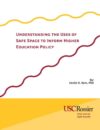Background | Overview | Researcher | Final Report | Funding
Background
In recent years there have been scandals and controversies around the idea of safe spaces, and related policies, in higher education. The volatility of the concept within higher education lies in the idea that a campus is a contested space, where various stakeholder groups vy for power and access to resources. The result of living in contested spaces as such is that competition for both physical and metaphorical space on campus also becomes politicized; these power dynamics reveal themselves in conflicts over authority, legitimation, privileges, and/or resources. The topic of safe spaces directly relates to issues of racial equity in three important ways: (1) the idea of safe spaces in higher education is historically linked to the LGBT community and students of color; (2) higher education scholars call on the creation of safe places as a way to support students and faculty of color; and (3) if education is to facilitate discourse about freedom and humanization between students, faculty, and staff, then safety in some form serves–to a degree–as necessary but insufficient condition for racial equity work to happen.
Project Overview and Goals
This project is a discourse analysis of how the term “safe space” has been reported in higher education news. Data was gathered from over 400 news articles that mentioned “safe space” between the years 2004-2018 and data will be analyzed through examination of the different ways it has either been implicitly or explicitly defined and the controversies linked with those definitions. This project functions on the overall premise that the idea of safe space is valuable in higher education, but will not offer specific policy recommendations for implementation. Instead, the researcher aims to create a brief that will provide: (1) an explanation of how the brief can inform the policy process; (2) a broad overview of the history and recent controversies surrounding safe space; (3) variations of how safe space is defined or enacted at campus, division, and classroom levels within an institution, with special attention given to the remote-learning campus; and (4) a list of resources for further information.
Researcher
 Dr. Cecile Sam is Project Lead and Principal Investigator for this project. She earned her PhD in Urban Education from USC in 2012 and is currently an Assistant Professor at Rowan University. Dr. Sam is a qualitative researcher whose current focus in on the nexus between grassroots leadership, faculty work, and educational policy that spans K-20 contexts. She is particularly interested in the role ethics plays in these areas.
Dr. Cecile Sam is Project Lead and Principal Investigator for this project. She earned her PhD in Urban Education from USC in 2012 and is currently an Assistant Professor at Rowan University. Dr. Sam is a qualitative researcher whose current focus in on the nexus between grassroots leadership, faculty work, and educational policy that spans K-20 contexts. She is particularly interested in the role ethics plays in these areas.
Final Report

Understanding the Narratives of Safe Space to Inform Higher Education Policy
Cecile Sam
Pullias Center for Higher Education (2021)
The report provides a broad overview of the history and recent controversies surrounding safe space, and explains the variation of how safe space is defined or enacted at campus, division, and classroom levels within institutions. The report also includes a list of resources to further inform policymakers on the topic.
This is one of five reports generated from research funded by the inaugural Pullias Center Equity Alumni Awards created to celebrate the 25th anniversary of the Pullias Center.
Categories: Racial Equity, Alumni Equity Award, Policymaking
equity alumni award racial equity
Download 171.13 KB 2363 Downloads
Funding
This project was selected as one of five recipients of the Pullias Center Equity Alumni Award in October 2020 to mark the 25th anniversary of the Pullias Center. Each of the five projects features an alumna or alumnus of the Pullias Center exploring a different facet of systemic racism that directly impacts Black, indigenous, people of color (BIPOC) access to education, specifically postsecondary education.